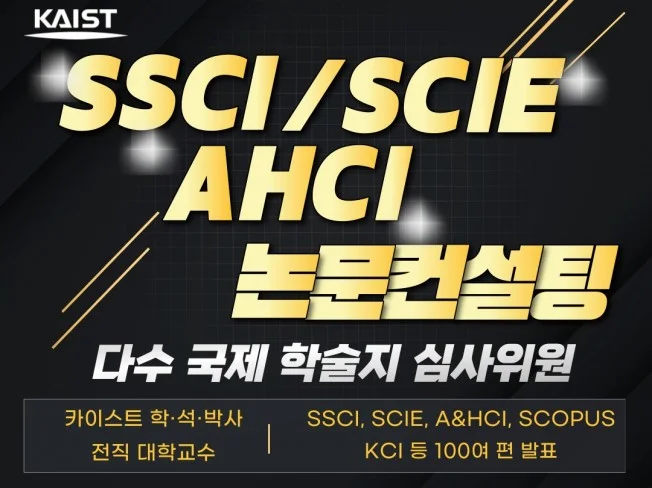
최근 받은 리뷰
전체보기서비스 설명
※ 각종 논문, 과제, 자기소개서 등의 문서를 '대신 작성'해주는 불법 서비스와 무관함을 알려 드립니다.
※ 서비스 설명
1) 제공할 서비스 설명 (서비스 판매의도, 목적, 효과)
- 본 논문 컨설팅 서비스는 연구자분들이 원하는 연구를 더욱 효과적으로 할 수 있게끔 도움을 드리는데 제공 의도가 있습니다. 본 서비스를 통하여 SCIE, SSCI, A&HCI 논문을 포함한 일반적인 영문 Report 작성 능력을 함양하실 수 있습니다.
2) 서비스 금액 산정기준 및 제공방식 안내 (견적 산정 기준, 시간, 범위, 방식)
- 유사 서비스 제공 업체 대비 SCIE, SSCI, A&HCI 논문에 집중적으로 차별화를 하였습니다. 서비스 금액은 고객 분의 연구 상황에 맞추어 조율이 가능합니다.
- 컨설팅 횟수와 시간은 '기본 컨설팅'의 경우 1회 30분(고객당 1회만 가능) 입니다. '단계별 컨설팅'은 고객분의 연구 상황에 맞추어서 조율되어 진행 됩니다. '종합 컨설팅'은 주제 선정부터 논문 투고까지 10주에 걸쳐 진행됩니다.
- 서비스 범위는 논문 작성에 필요한 지식 전수, 저널별 특성, 작성 요령(Manuscript Writing), 초록 작성(Abstract), 구조적 초록 작성(Structured Abstract), 서론 구성(Introduction), 문헌 검색(Literature Review), 연구 모형 설계(Research Modeling), 인용법(Citation), 참고문헌 정리(Reference), 원고 교정(Proofreading), 커버레터(Cover Letter) 작성요령, 커멘트(Comment) 작성법, 윤리 서약 동의문(Compliance with Ethical Statement) 작성법, 심사 응답 편지(Response Letter) 등입니다. 비대면 미팅 방식으로 진행합니다.
※ 전문가 소개
1) 전문가 자기소개
저는 논문을 읽고 쓰는 것을 즐기는 연구자입니다.
2) 전문가 경력/이력사항
과학고 조기 졸업
카이스트 학, 석, 박사
전직 대학교수
전(前) 한국경영정보학회 이사, 전 한국정보시스템학회 이사, 전 한국인터넷전자상거래 이사, 전 국제 e-비즈니스 학회 이사, 전 국제지식서비스 학회 이사
현(現) 국제 저널 'AI' 특집호 편집장
https://www.mdpi.com/journal/ai/special_issues/1E867U567B
현(現) 다수 SCI급 국제 학술지 심사위원 활동 중
- Applied Sciences
- Asia Pacific Journal of Education
- Asian Pacific Journal of Marketing and Logistics
- BMC Infectious Disease
- BMC Nursing
- BMC Public Health
- British Journal of Educational Technology
- Computing
- Education and Information Technologies
- Electronics
- European Journal of Education
- European Journal of Innovation and Management
- Heliyon
- Health and Social Care in Community
- Humanities and Social Sciences Communications
- Information Communication & Society
- Information Development
- Information Resources Management Journal
- Information Technology & People
- Interactive Learning Environments
- International Journal of Human-Computer Interaction
- International Journal of Mobile Communications
- International Review of Research in Open and Distributed Learning
- Journal of Business Ethics
- Journal of the Knowledge Economy
- Journal of Open Innovation
- Knowledge Management Research and Practice
- Leisure Studies
- Marketing Intelligence and Planning
- Mathematics
- Medicine
- PLOS ONE
- Scientific Reports
- Service Industries Journal
- Sustainability
- Technology in Society
3) 서비스 제공 주요 분야 및 차별화 포인트
서비스 제공 주요 분야는 상경계열, 사회과학계열, 보건, 스포츠과학, 기타 행위 연구(설문조사, 통계분석)에 해당하는 논문의 컨설팅입니다. 전/현직 경험들을 바탕으로 ‘연구자에게 필요한 역량’과 ‘논문 작성에 요구되는 핵심적인 내용’을 친절하게 전달해 드립니다.
구체적인 내용은 아래와 같습니다.
1. Writing: Intro, Theoretical Background, Research Model, Results, Discussion, Conclusion, Reference의 효과적이고 효율적인 작성 요령, Endnote 최대 활용법
2. Proofreading: APA에서 권고하는 간결하고 핵심적인 문장으로 교정 (Wordy, Long sentence, Preposition, General Grammar 교정)
3. Submission: Appropriate Journal 결정 요령, Guidelines for Authors 주요 내용, 저널별 투고 절차, 저널별 투고 시스템, 출판사별 투고 과정 특색, 투고 준비물, Open Access 조건 확인 등과 관련한 전반적인 내용
- Comments, Cover Letter, Structured Abstract, Declaration (Full Ethics Statement, Compliance with Ethical Statement, Conflict of Interest statement, Ethics Approval and Consent to participate, IRB Approval, Consent for Publication, Availability of Data and Material, Competing Interests, Funding Informed Consent) 작성 요령
4. Reply to Review: 심사위원들의 지적 사항에 대한 논리 방어 전개 방법, 서신 작성 요령, 수정 테이블 작성 노하우, 심사위원들을 납득 시킬 수 있는 문장법
4) 기존 작업물 / 포트폴리오 (학술 논문 출판 목록)
SCIE, SSCI, A&HCI, SCOPUS, KCI 논문 100여 편 출판: Asia Pacific Viewpoint, Asia-Pacific Education J, BMC Public Health, BMC Psychology, Frontiers in Psychology, Heliyon, Humanities and Social Sciences Communications, Information Development, Information Technology and Tourism, International Journal Human Computer Interaction, Journal Business and Industrial Marketing, Journal Information Science, Journal the Knowledge Economy, Mobile Information Systems, PLOS ONE, Scientific Reports, Sustainability, Technology Analysis & Strategic Management, among others
4.A. SCIE/SSCI/A&HCI (Published)
*** 주요 출판 논문 ***
* JCR 상위 1%: From concerns to benefits: a comprehensive study of ChatGPT usage in education. International Journal of Educational Technology in Higher Education, 21(1), 35. https://doi.org/10.1186/s41239-024-00471-4, 2024. (IF 8.6 JCR 상위 1%)
* JCR 상위 3%: A comprehensive analysis of presence, seamlessness, and player responses in metaverse gaming. Computers in Human Behavior, 159, 108345. https://doi.org/https://doi.org/10.1016/j.chb.2024.108345, 2024. (IF 9.0 JCR 상위 3%)
* JCR 상위 4%: Understanding AI tool engagement: A study of ChatGPT usage and word-of-mouth among university students and office workers. Telematics and Informatics (SSCI), 85, 102067. https://doi.org/https://doi.org/10.1016/j.tele.2023.102067, 2023. (IF 7.6 JCR 상위 4%)
* JCR 상위 6%: Enhancing digital literacy in later life: the role of perseverance and consistency of interest. Interactive Learning Environments, 1-16. https://doi.org/10.1080/10494820.2024.2414355, 2024. (IF 3.7 JCR 상위 6%)
* JCR 상위 8%: Tourism in the digital frontier: a study on user continuance intention in the metaverse. Information Technology & Tourism (SSCI). https://doi.org/10.1007/s40558-023-00257-w, 2023. (IF 6.3 JCR 상위 8%)
*** SCI급 논문 전체 출판 목록 ***
[1] Enhancing digital literacy in later life: the role of perseverance and consistency of interest. sInteractive Learning Environments, 1-16. https://doi.org/10.1080/10494820.2024.2414355, 2024.
[2] Adoption and Continuance in the Metaverse. Electronics, 13(19), 3917. https://www.mdpi.com/2079-9292/13/19/3917 2024.
[3] Differential Effects of Collaborative Partners on Financial and Growth Outcomes in Ventures in South Korea. Asia Pacific Business Review. https://doi.org/10.1080/13602381.2024.2402456, 2024.
[4] Exploring the adoption of social robots: Influences of promotion focus, anthropomorphism, and monetary sacrifice. Social Behavior and Personality: an international journal, 52(9), e13459. https://doi.org/https://doi.org/10.2224/sbp.13459, 2024.
[5] Wellness and Wanderlust: How Social Wellness Impacts Travel Motivation. International Journal of Tourism Research, 26(5), e2745. https://doi.org/https://doi.org/10.1002/jtr.2745, 2024.
[6] Investigating viewer engagement in esports through motivation and attitudes toward metaverse and NFTs. Scientific Reports, 14(1), 19934. https://doi.org/10.1038/s41598-024-70847-z, 2024.
[7] Utilizing Topic Modeling to Identify Sustainability Trends in the Golf Industry. Sustainability, 16(15), 6507. https://www.mdpi.com/2071-1050/16/15/6507 2024.
[8] Why Do Online Crowdsourcing Platform (OCP) Visitors Recommend Idea Competition to Others? Sage Open, 14(3), 21582440241266063. https://doi.org/10.1177/21582440241266063, 2024.
[9] Understanding digital engagement: factors influencing awareness and satisfaction of digital transformation. Discover Computing, 27(1), 23. https://doi.org/10.1007/s10791-024-09455-4, 2024.
[10] Omnichannel word-of-mouth genesis: the confluence of online-offline experiences, social influence and skepticism. Asia Pacific Journal of Marketing and Logistics, ahead-of-print(ahead-of-print). https://doi.org/10.1108/APJML-03-2024-0259, 2024.
[11] A Multi-Faceted Examination of Social Robots Adoption: Influences of Perceived Enjoyment, Social Attraction, and Pet Experience. IEEE Access, 1-1. https://doi.org/10.1109/ACCESS.2024.3434544, 2024.
[12] Impact of COVID-19 on mobile application usage intensity. International journal of Mobile Communications, 24(1), 64-81. https://doi.org/10.1504/IJMC.2024.139308, 2024.
[13] Virtual resonance: analyzing IPA usage intensity under COVID-19's isolating canopy. Scientific Reports, 14(1), 15048. https://doi.org/10.1038/s41598-024-64809-8, 2024.
[14] Exploring loyalty drivers for smartphone and mobile carriers. Humanities and Social Sciences Communications, 11(1), 859. https://doi.org/10.1057/s41599-024-03371-0, 2024.
[15] A comprehensive analysis of presence, seamlessness, and player responses in metaverse gaming. Computers in Human Behavior, 159, 108345. https://doi.org/https://doi.org/10.1016/j.chb.2024.108345, 2024.
[16] From concerns to benefits: a comprehensive study of ChatGPT usage in education. International Journal of Educational Technology in Higher Education, 21(1), 35. https://doi.org/10.1186/s41239-024-00471-4, 2024.
[17] Subscription intentions for ChatGPT plus: a look at user satisfaction and self-efficacy. Marketing Intelligence & Planning, ahead-of-print(ahead-of-print). https://doi.org/10.1108/MIP-08-2023-0411, 2024.
[18] Impacts of noise-induced hearing loss on sleep, health, and workplace: Multi-group analysis. Heliyon, 10(9). https://doi.org/10.1016/j.heliyon.2024.e30861, 2024.
[19] Investigating the Factors Influencing User Loyalty, Purchase Intention, and Word-of-mouth in Virtual Reality. PRESENCE: Virtual and Augmented Reality, 1-59. https://doi.org/10.1162/pres_a_00423, 2024.
[20] Metaverse gaming: analyzing the impact of self-expression, achievement, social interaction, violence, and difficulty. Behaviour & Information Technology, 1-15. https://doi.org/10.1080/0144929X.2024.2341059, 2024.
[21] Effects of ChatGPT’s AI capabilities and human-like traits on spreading information in work environments. Scientific Reports, 14(1), 7806. https://doi.org/10.1038/s41598-024-57977-0, 2024.
[22] Navigating Online Learning Satisfaction in the Age of COVID-19: An Examination of Key Influencing Factors. Journal of Internet Technology, 25(2), 185-194. https://doi.org/10.53106/160792642024032502002, 2024.
[23] Navigating the Omnichannel Landscape: Unraveling the Antecedents of Customer Loyalty. Sage Open, 14(1), 21582440241233091. https://doi.org/10.1177/21582440241233091, 2024.
[24] From storefront to screen: an in-depth analysis of the dynamics of online for offline retailing. Humanities and Social Sciences Communications, 11(1), 209. https://doi.org/10.1057/s41599-024-02723-0, 2024.
[25] Uncovering the Reasons behind Willingness to Pay for ChatGPT-4 Premium. International Journal of Human–Computer Interaction (SCIE/SSCI), 1-16. https://doi.org/10.1080/10447318.2024.2307692, 2024.
[26] The sound of safety: exploring the determinants of prevention intention in noisy industrial workplaces. BMC Public Health (SCIE), 24(1), 90. https://doi.org/10.1186/s12889-023-17618-z, 2024.
[27] Sequential customer experiences leading to continuance intention in the mobile telecom industry: from contract to call center. Telecommunication Systems (SCIE). https://doi.org/10.1007/s11235-023-01090-6, 2024.
[28] Analyzing ChatGPT adoption drivers with the TOEK framework. Scientific Reports (SCIE), 13(1), 22606. https://doi.org/10.1038/s41598-023-49710-0, 2023.
[29] From Classroom to Screen: Analyzing the Mechanisms Shaping E-Learning Benefits Amidst COVID-19. Journal of the Knowledge Economy (SSCI). https://doi.org/10.1007/s13132-023-01614-0, 2023.
[30] Determinants of Word-of-Mouth in the Virtual Reality Market: A Focus on Aesthetic Attributes and Perceived Value. International Journal of Human–Computer Interaction (SCIE/SSCI), 1-17. https://doi.org/10.1080/10447318.2023.2285644, 2023.
[31] Exploring the dynamics of mobile app addiction: the interplay of communication, affective factors, flow, perceived enjoyment, and habit. BMC Psychology (SSCI), 11(1), 404. https://doi.org/10.1186/s40359-023-01440-8, 2023.
[32] Factors influencing continuance intention of participants in crowdsourcing. Humanities and Social Sciences Communications (SSCI/A&HCI), 10(1), 824. https://doi.org/10.1057/s41599-023-02335-0, 2023.
[33] AI in the Workplace: Examining the Effects of ChatGPT on Information Support and Knowledge Acquisition. International Journal of Human–Computer Interaction (SCIE/SSCI), 1-16. https://doi.org/10.1080/10447318.2023.2278283, 2023.
[34] A study of user switching intention for ERP systems based on push-pull-mooring model: Focusing on the important role of information quality for users. PLOS ONE (SCIE), 18(11), e0289483. https://doi.org/10.1371/journal.pone.0289483, 2023.
[35] Understanding AI tool engagement: A study of ChatGPT usage and word-of-mouth among university students and office workers. Telematics and Informatics (SSCI), 85, 102067. https://doi.org/https://doi.org/10.1016/j.tele.2023.102067, 2023.
[36] Understanding continuance intention of enterprise resource planning (ERP): TOE, TAM, and IS success model. Heliyon (SCIE), 9(10). https://doi.org/10.1016/j.heliyon.2023.e21019, 2023.
[37] Predictors of social networking service addiction. Scientific Reports (SCIE), 13(1), 16705. https://doi.org/10.1038/s41598-023-43796-2, 2023.
[38] Decoding the ChatGPT mystery: A comprehensive exploration of factors driving AI language model adoption. Information Development (SSCI), 02666669231202764. https://doi.org/10.1177/02666669231202764, 2023.
[39] Improving Collaborative Filtering Recommendations with Tag and Time Integration in Virtual Online Communities. Applied Sciences (SCIE), 13(18), 10528. https://www.mdpi.com/2076-3417/13/18/10528 2023.
[40] Affordance, usefulness, enjoyment, and aesthetics in sustaining virtual reality engagement. Scientific Reports (SCIE), 13(1), 15097. https://doi.org/10.1038/s41598-023-42113-1, 2023.
[41] Customization, loneliness, and optimism: drivers of intelligent personal assistant continuance intention during COVID-19. Humanities and Social Sciences Communications (SSCI/A&HCI), 10(1), 529. https://doi.org/10.1057/s41599-023-02021-1, 2023.
[42] Social isolation in COVID-19: a comparative study between Korea and Vietnam. BMC Public Health (SCIE), 23(1), 1556. https://doi.org/10.1186/s12889-023-16491-0, 2023.
[43] Mechanisms for successful management of enterprise resource planning from user information processing and system quality perspective. Scientific Reports (SCIE), 13(1), 12678. https://doi.org/10.1038/s41598-023-39787-y, 2023.
[44] Tourism in the digital frontier: a study on user continuance intention in the metaverse. Information Technology & Tourism (SSCI). https://doi.org/10.1007/s40558-023-00257-w, 2023.
[45] Impacts of social isolation and risk perception on social networking intensity among university students during covid-19. PLOS ONE (SCIE), 18(4), e0283997. https://doi.org/10.1371/journal.pone.0283997, 2023.
[46] What Drives Recommendation Intention and Loyalty of Online for Offline (O4O) Consumers? Sustainability (SCIE/SSCI), 15(6), 4775. https://www.mdpi.com/2071-1050/15/6/4775 2023.
[47] Hi Bixby: Determinants of goal-congruent usage and goal-congruent outcome in the artificial intelligence personal assistant context. Journal of Information Science (SCIE/SSCI), 01655515231161554. https://doi.org/10.1177/01655515231161554, 2023.
[48] Understanding the Continuance Intention of Omnichannel: Combining TAM and TPB. Sustainability, 15(4), 3039. https://doi.org/https://doi.org/10.3390/su15043039, 2023.
[49] Examining the key factors influencing loyalty and satisfaction toward the smart factory. Journal of Business & Industrial Marketing (SSCI), 38(3), 484-493. https://doi.org/10.1108/JBIM-02-2021-0124, 2023.
[50] Understanding the key antecedents of users’ continuance intention in the context of smart factory. Technology Analysis & Strategic Management (SSCI), 35(2), 153-166. 2023.
[51] Antecedents of Continuance Intention of Social Networking Services (SNS): Utilitarian, Hedonic, and Social Contexts. Mobile Information Systems (SCIE), 2022, 7904124. https://doi.org/10.1155/2022/7904124, 2022.
[52] Determinants of continuance intention towards e-learning during COVID-19: an extended expectation-confirmation model. Asia Pacific Journal of Education (SSCI), 1-21. https://doi.org/10.1080/02188791.2022.2140645, 2022.
[53] Continuance intention to use artificial intelligence personal assistant: type, gender, and use experience. Heliyon (SCIE), 8(9), e10662. https://doi.org/https://doi.org/10.1016/j.heliyon.2022.e10662, 2022.
[54] What drives university students to practice social distancing? Evidence from South Korea and Vietnam. Asia Pacific Viewpoint (SSCI), 64(1), 47-59. https://doi.org/https://doi.org/10.1111/apv.12351, 2023.
[55] Effects of Psychological Discomfort on Social Networking Site (SNS) Usage Intensity During COVID-19. Frontiers in Psychology (SSCI), 13, 939726. https://doi.org/10.3389/fpsyg.2022.939726, 2022.
[56] Success factors of untact lecture system in COVID-19: TAM, benefits, and privacy concerns. Technology Analysis & Strategic Management (SSCI), 1-13. https://doi.org/10.1080/09537325.2022.2093709, 2022.
[57] Key Factors Influencing Loyalty and Satisfaction Toward ERP: Mediating Role of Flow. Journal of the Knowledge Economy (SSCI). https://doi.org/10.1007/s13132-022-00981-4, 2022.
[58] Determinants of postadoption behaviors of mobile communications applications: a dual-model perspective. International Journal of Human-Computer Interaction (SCIE/SSCI), 30(7), 547-559. https://doi.org/https://doi.org/10.1080/10447318.2014.888501, 2014.
서비스 제공 절차
1. 저에게 쪽지로 컨설팅을 받고자 하는 내용을 문의해 주세요.
2. 쪽지로 상담이 끝나면 크몽을 통해 원하는 옵션을 결제해 주세요.
3. 미팅 전에 현재까지 작업된 내용물을 저에게 보내주세요.
4. 미팅은 줌으로 진행이 됩니다. 미팅 전에 제가 링크를 보내 드려요.
5. 미팅이 끝나면 논문 진행에 필요한 파일, 관련 자료 들을 보내 드립니다. 이후, 구매확정과 구매후기를 남겨 주시면 됩니다.
작업 언어
영어
준비 단계
주제 선정
프로포절
논문 초고
논문 통계
본심/결론
심사방어
논리적교정
논문 종류
학술지
논문 분야
상경
사회과학
의학/보건
인문학
예술/체육
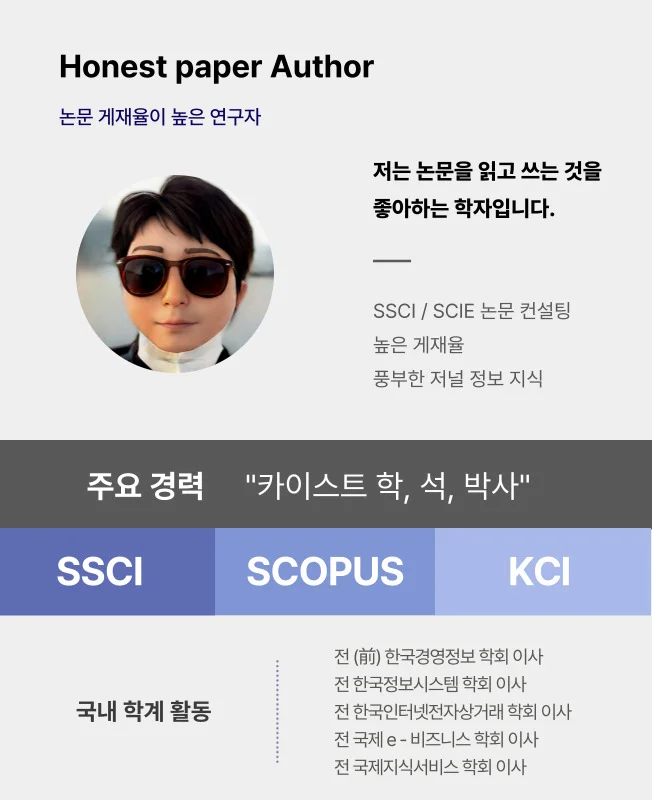
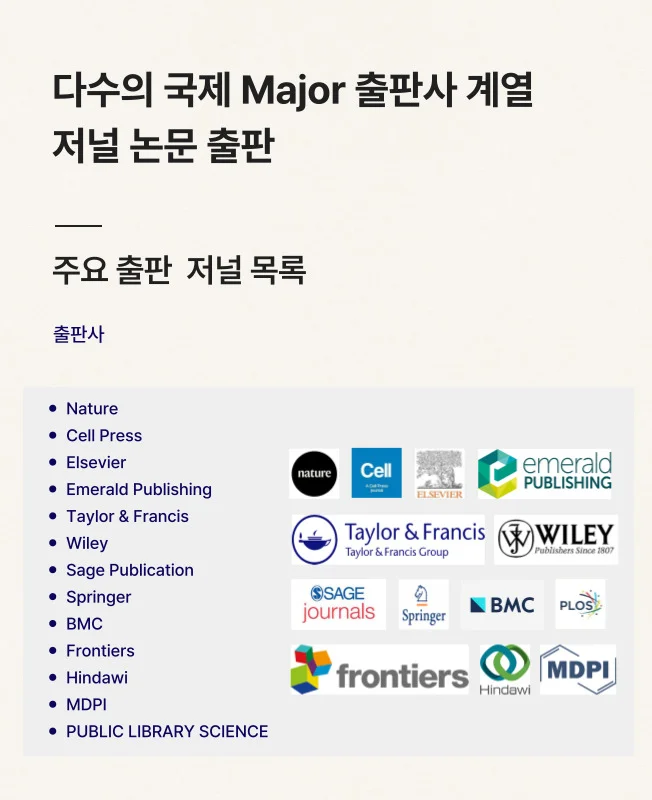
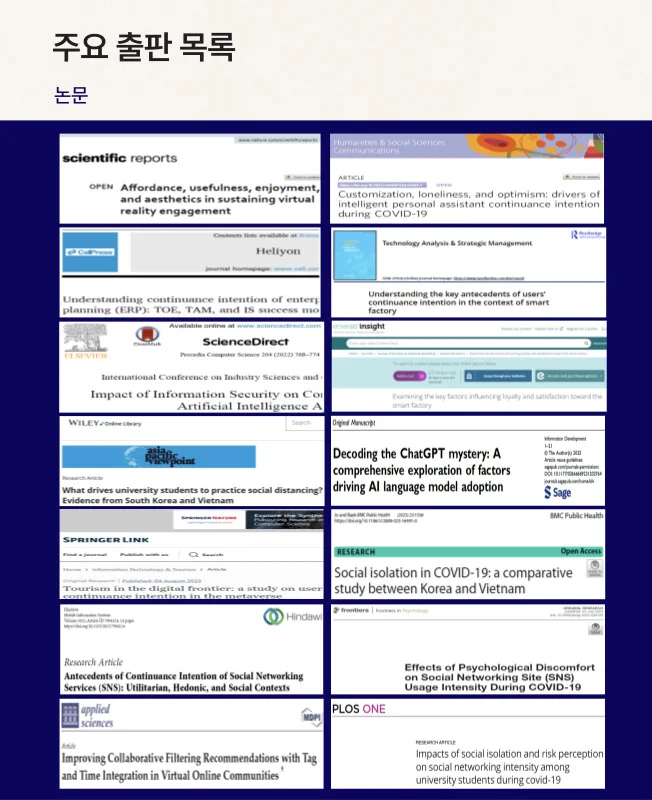
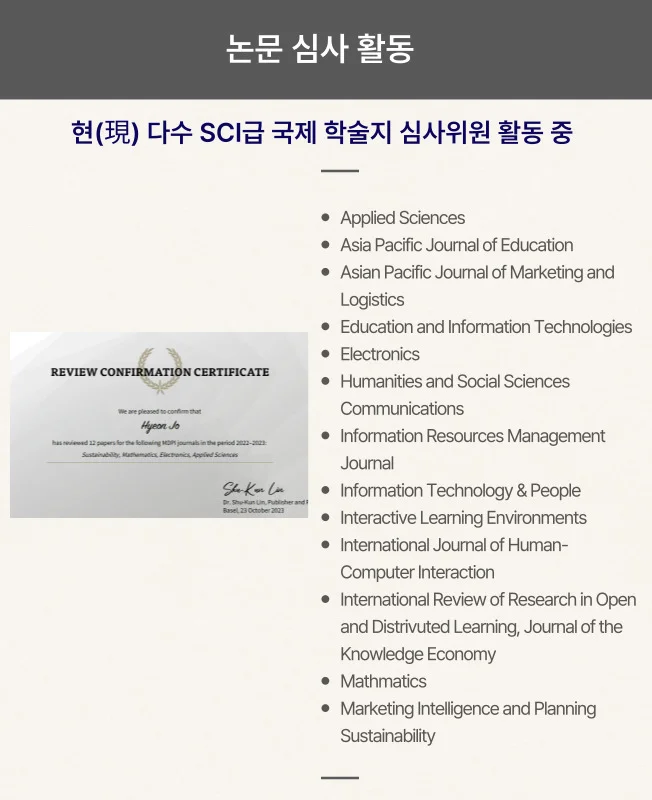
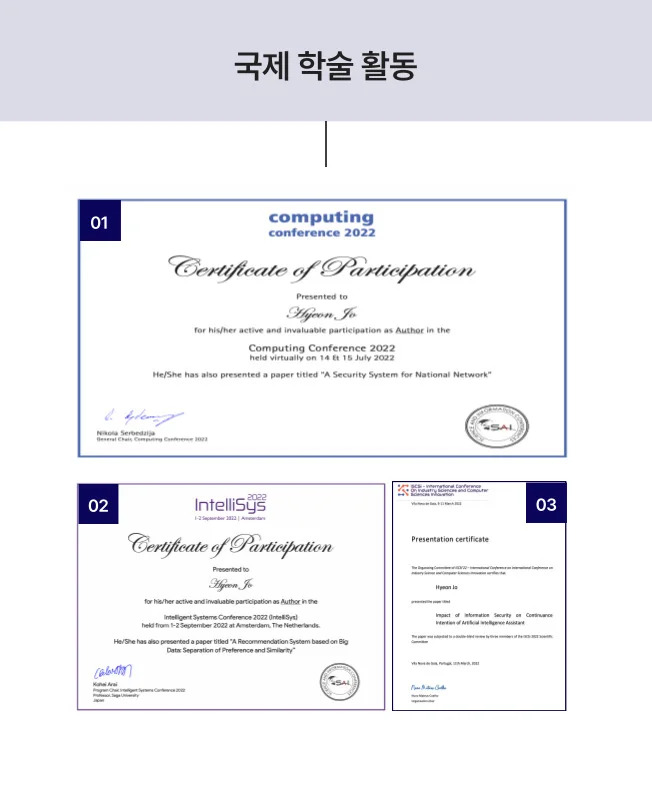
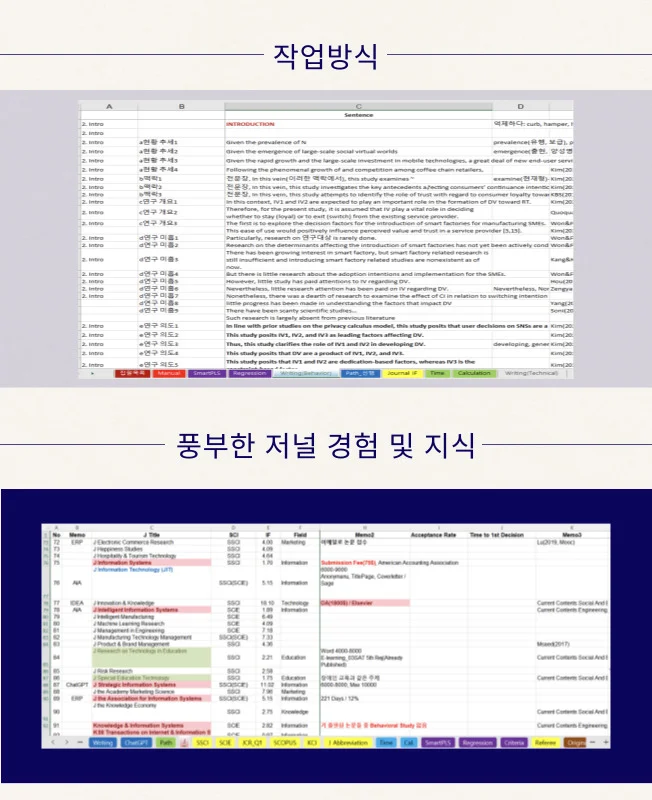
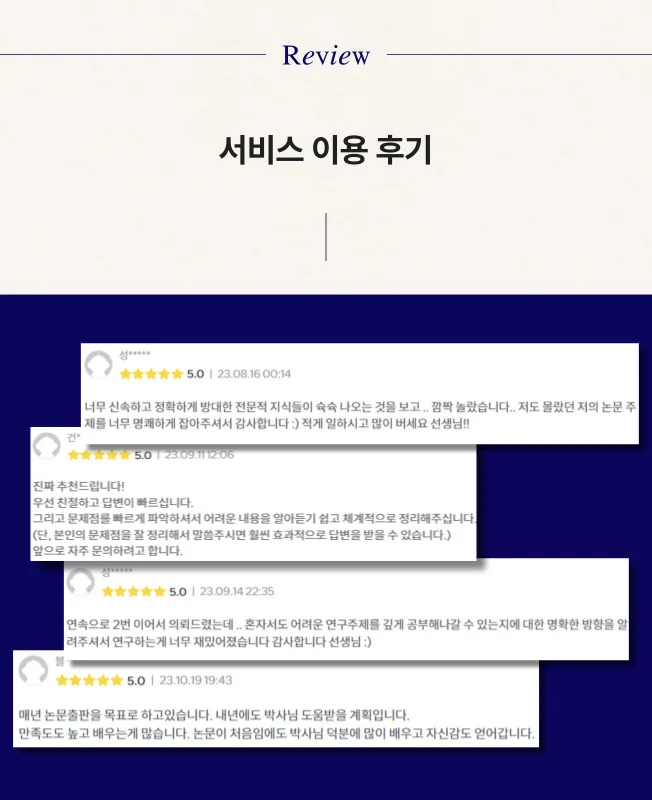
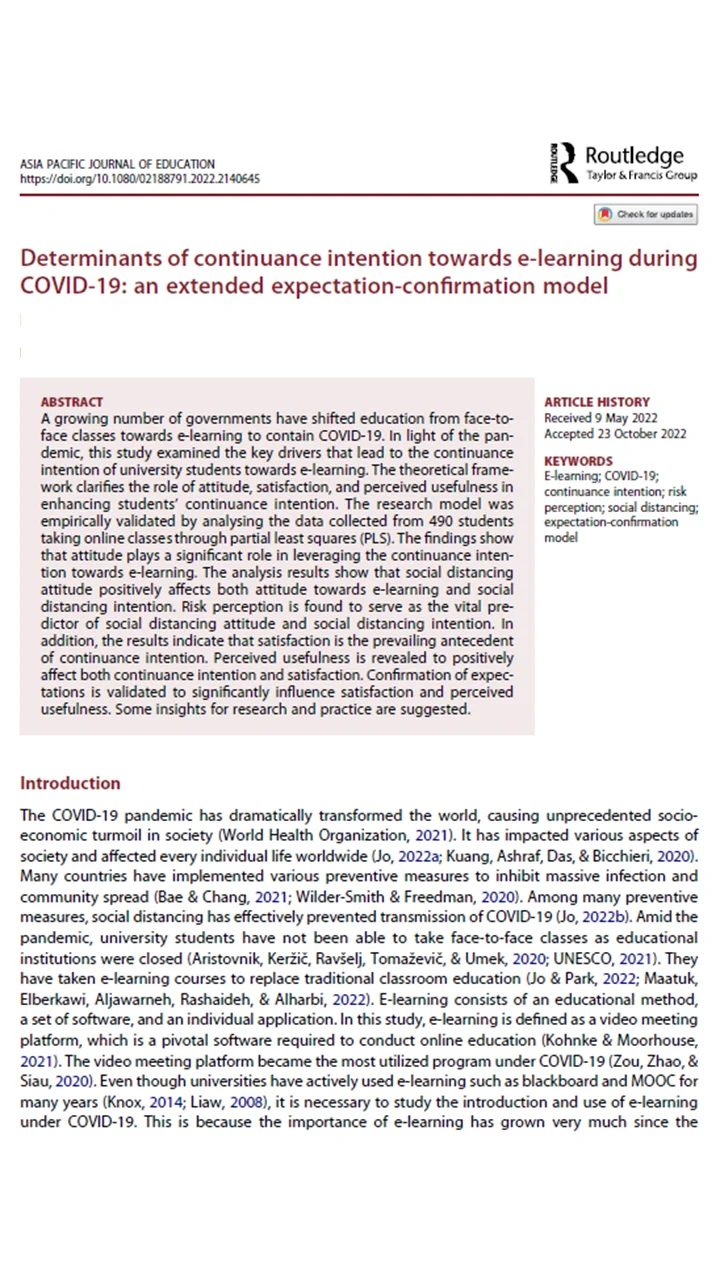
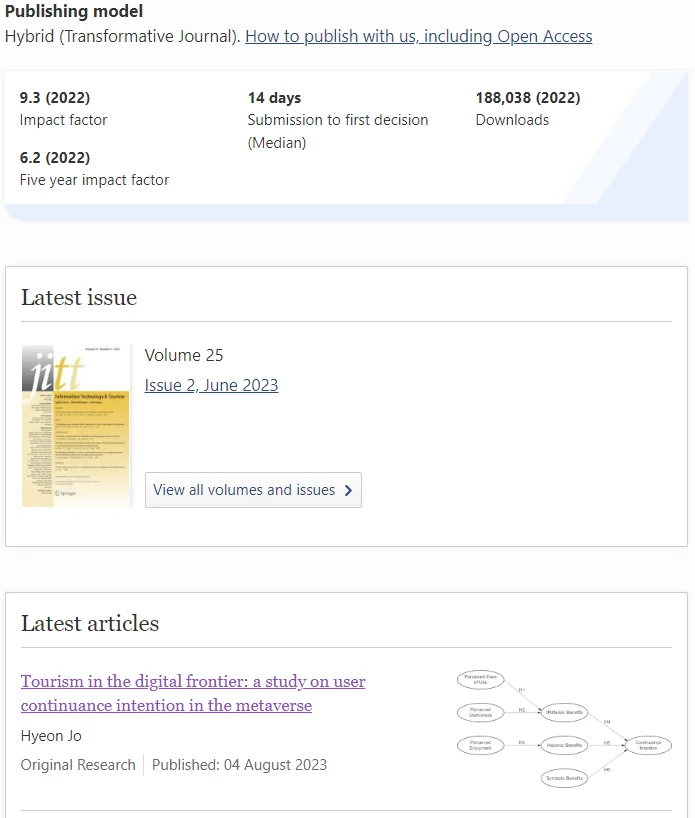
가격 정보
패키지 별 주요 특징을 비교해 보세요
공통점
- 모든 패키지는 컨설팅 서비스를 제공하며, 각 패키지에 따라 컨설팅의 범위와 기간이 다릅니다.
주요 특징
- STANDARD : 기본적인 저널 검색법과 논문 주제에 대한 30분 문답 컨설팅 제공.
- DELUXE : 연구 모형 설계와 통계 분석을 포함한 단계별 컨설팅 제공.
- PREMIUM : 논문 투고까지의 종합 컨설팅과 무제한 수정 제공.
STANDARD
100,000원
DELUXE
3,500,000원
PREMIUM
6,000,000원
패키지 설명
시간형 컨설팅(30분)
저널 검색법, 논문 주제, 저널별 성향 등 기본적인 컨설팅 30분 간 문답 컨설팅
단계별 컨설팅
연구 모형 설계, 통계 분석, 시사점 도출 등 단계별 컨설팅
종합형 컨설팅
논문 원고를 투고할 때까지의 종합 컨설팅(레퍼런스 포함)
작업일
7일
35일
49일
수정 횟수
0회
1회
제한없음
전문가 정보
수정 및 재진행
고객과 연구 범위에 대하여 상의를 한 뒤 수정 범위를 결정합니다.
취소 및 환불 규정
가. 기본 환불 규정 1. 작업 진행 전일 경우 전문가와 의뢰인 상호 협의하에 청약 철회 및 환불이 가능합니다. 2. 작업 진행 후 의뢰인의 단순 변심으로 인한 환불 요청은 제한될 수 있습니다. 3. 작업이 완료된 이후 또는 자료, 문서 등 서비스가 제공된 이후에는 환불이 불가합니다. (소비자보호법 17조 2항의 5조. 용역 또는 「문화산업진흥 기본법」 제2조제5호의 디지털콘텐츠의 제공이 개시된 경우에 해당) 나. 전문가 책임 사유 1. 전문가의 귀책사유로 당초 약정했던 서비스 미이행 혹은 보편적인 관점에서 심각하게 잘못 이행한 경우 결제 금액 전체 환불이 가능합니다. 다. 의뢰인 책임 사유 1. 서비스 진행 도중 의뢰인의 귀책사유로 인해 환불을 요청할 경우, 사용 금액을 아래와 같이 계산 후 총 금액의 10%를 공제하여 환불합니다. - 총 작업 진행량의 1/3 경과 전 : 이미 납부한 요금의 2/3해당액 - 총 작업 진행량의 1/2 경과 전 : 이미 납부한 요금의 1/2해당액 - 총 작업 진행량의 1/2 경과 후 : 반환하지 않음 2. 작업 진행 중 의뢰인의 폭언, 욕설 등이 있을 경우 작업은 종료될 수 있으며 환불이 제한될 수 있습니다.
상품정보고시
| 서비스 제공자 | SuperPaperAuthor | 취소/환불 조건 | 취소 및 환불 규정 참조 |
| 인증/허가사항 | 상품 상세 참조 | 취소/환불 방법 | 취소 및 환불 규정 참조 |
| 이용조건 | 상품 상세 참조 | 소비자상담전화 | 결제 전 상담 제공 |
리뷰
5.0
(72)
